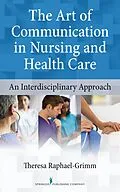A handy guide to tackling difficult patient and professional interactions with confidence and compassion
In this age of increasing reliance on technology, it is essential that the fundamentals of compassion and good communication?the art of patient care?remain at the heart of health care. This clear, concise guide to professional communication strategies helps nurses and other health care clinicians to build effective patient relationships and navigate a wide variety of difficult patient and professional interactions. Written by a practicing psychotherapist who has devoted nearly 30 years of study to clinician?patient relationships, the book tackles such complex issues as dealing with demanding patients, maintaining professional boundaries, overcoming biases and stereotypes, managing clinician emotions, communicating bad news, challenging a colleague's clinical opinion, and other common scenarios.
The book guides the reader through a conceptual framework for building effective relationships that is based on the principles of mindfulness. These principles are embedded in discussions of the fundamental elements of interpersonal effectiveness, such as hope, empathy, and listening. Chapters apply mindfulness principles to specific challenging situations with concrete examples that describe effective clinical behaviors as well as situations depicting pitfalls that may impede compassionate care. From a focus on everyday manners in difficult situations to beneficial approaches with challenging populations, the guide helps health care professionals confidently resolve common problems. Brief, to-the-point chapters help clinicians channel their clinical knowledge and good intentions into caring behaviors that allow the patient to more fully experience empathy and compassion. With the guiding theme of ?using words as precision instruments,? this is a resource that will be referred to again and again.
Key Features:
• Helps health care professionals and nurses communicate effectively in challenging clinical and professional situations
• Uses the principles of mindfulness to build satisfying relationships and resolve problems
• Addresses such difficult issues as demanding patients, maintaining boundaries, overcoming biases, managing clinician emotions, and much more
• Provides special tips for communicating with family members and caregivers
• Authored by a practicing psychotherapist specializing in clinician?patient relationships for nearly 30 years
Autorentext
Theresa Raphael-Grimm, PhD, CNS, holds a joint appointment as clinical associate professor in the Schools of Nursing and Medicine as well as an adjunct appointment as associate professor of psychiatry at the University of North Carolina?Chapel Hill (UNC-CH).
Inhalt
"Contents
- Encounters
- Mindfulness
- Empathy
- Listening
- Words
- Patients' Emotions
- Time
- Boundaries
- Biases
- Clinician Emotions
- 11. Mistakes and Apologies
- Hope and Bad News
- Grief
- Expressing Condolences
- Disgust
- Difficult Encounters
- Somatic Complaints
- Clinician Conflict
- Substance Abuse
- Cultivating Mindfulness
Preface
SECTION I: GOOD COMMUNICATION SKILLS: THE FOUNDATIONS
SECTION II: NAVIGATING PROFESSIONAL COMMUNICATION CHALLENGES
SECTION III: EVERYDAY MANNERS IN DIFFICULT CLINICAL SITUATIONS
SECTION IV: EFFECTIVE APPROACHES IN CHALLENGING POPULATIONS
SECTION V: AFTERWORD
Index
